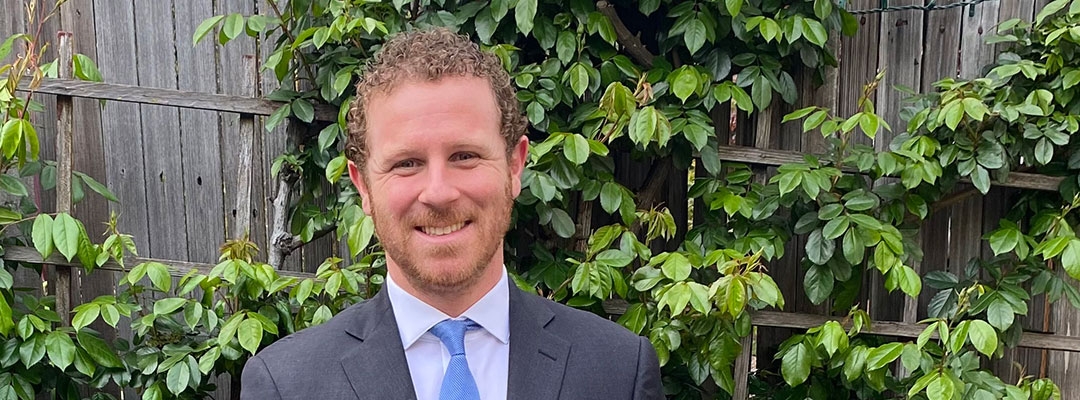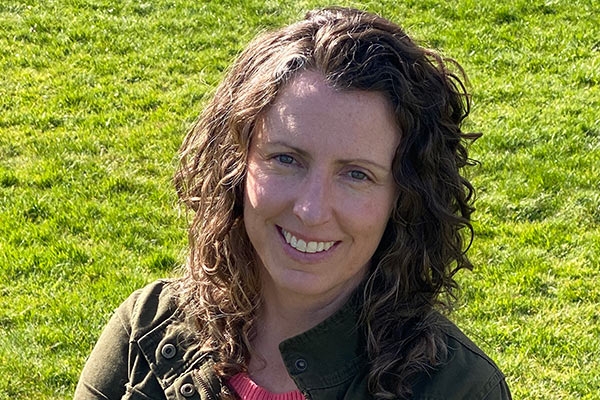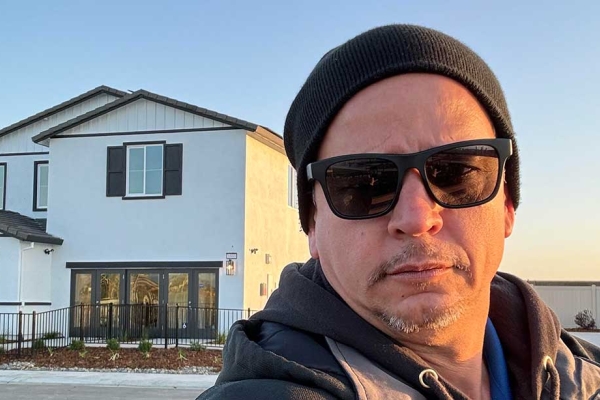The career connections between psychology, chemistry and construction might not have been apparent at first to Alex Guidici. The path he found himself on was interspersed with bumps, interwoven with life lessons in business and leadership. It was Alex’s growth mindset and determination to succeed—as well as the encouragement from a manager at his current company—that eventually led this psychology and chemistry dual-degree-earner to our Certificate Program in Construction Management and Leadership.
Finding His Footing
“I love being around people—a true extrovert—and I credit this for my decision to pursue psychology in college,” this Piedmont, Calif., native says. After being accepted to UC Santa Cruz, “It took two years to learn two things: I wanted to focus on the neurochemical side of psychology, and the psychology degree at UCSC did not offer a path in that direction. I needed to take my education into the hard sciences—biology or chemistry.”
Road bump number one: While Alex did receive his undergraduate degrees in psychology and chemistry, he found work closer to the hard sciences. However, stints in the chemical industry as a manufacturing technician and as an analytical chemist did not suit him or meet his desired career goals.
It was back to the drawing board. But then, his childhood best friend sent him a job description for a project engineer in construction. This opened up the potential for a different career direction for Alex.
Signs Pointing in a New Direction
“My friend thought that the skill set and duties of a project engineer sounded like a good fit for me,” Alex says. “I did not apply to that job specifically, but it was only a couple months later that I saw a Craigslist ad for project engineer at Cameron Builders, Inc., a radiology construction company. This time I did apply and got the interview. The interview went well, but they gave the position to someone else, saying, ‘We did like you though, stay in touch.’” (Road bump number two.)
Still looking for a job periphery to neurochemistry, Alex began to realize that he wanted to make a substantial career change and would need to pivot. In the meantime, Alex started a professional position at Technical Safety Services as a field technician, where he traveled to various laboratories around the Bay Area to certify their HEPA-filtered air systems for clean air environments. But this did not fulfill Alex’s career aspirations.
Remember the company that had the project engineer role he interviewed for but didn’t get? This is a great reminder to follow up with organizations for which you want to work, even if you didn’t succeed the first time. It had been three months since Alex had interviewed at Cameron Builders, Inc., so he decided to check in with the organization.
“They had a different offer for me,” Alex says. “Spend a year in the field pushing a broom, learning how the projects are built, and then I could move to the office side if I still wanted. I accepted without hesitation, and so began my career in construction.”
The Study of Construction Management and Leadership
When Alex began with Cameron Builders, Inc., in 2016, he was working in infection control, organizing the construction of infectious barriers between a hybrid operating room and the neuro ICU at UCSF Parnassus. Without a background in construction of his own, Alex’s colleagues’ experiences in the Certificate Program in Construction Management and Leadership were the catalyst to enhance his career.
“My supervisor told me about the construction management certificate pretty immediately after I started working in the office,” Alex says. “He had gotten his certificate after five years being in the field. We discussed it for a while—both having very different opinions on the matter. His argument was that it looks good on a résumé, and I might learn something useful or meet someone useful. I gave the second part some consideration but did not want to go to school for something that I was already learning daily from my job.”
During the next five years, Alex moved to a project engineer position and then a project manager role, which he holds today. Also during this time, thoughts of furthering his education with the certificate program resurfaced. In September 2021, he took the steps to develop his skill set.
“Call it timing, but that is what eventually led me to start the certificate,” he says. “The program had moved online, and I was watching one of my coworkers make her way through the requirements. The amount of work looked manageable for someone with a full-time job, and I had free time outside of work. I decided this program would fit perfectly into my open schedule—now was the time! It also helped that my boss offered to pay for it. My workplace strongly encouraged it.
“I was very optimistic about learning small gems of knowledge—little lessons that I knew would apply to my professional objectives,” Alex continues. “I was also excited to exercise my brain with academics again. I think that school-type learning is a very specific exercise for the brain, and an extremely important faculty to maintain.”
Even with the certificate program fully online, there is still the ability to network.
“Taking these classes acts as a big networking event,” he says. “Even though I work in a very specific sector of construction, it was amazing to learn about everyone else’s roles in the industry. These connections might be helpful to my professional endeavors one day—they could even help me land future job positions or promotions. I see this as the most important reason for completing a certificate program in the same subject as my career.”
Alex was on the career path for construction management, completing general project management and leadership courses along with more focused courses that provided new knowledge and additional skill development. Of those, which instructor and course made the biggest impact on his current career trajectory? Miguel Galarza and the Preconstruction Estimating: From the Design Development Stage to the Final Bid Process class.
“I thoroughly enjoyed learning about estimating as it applies to each trade,” Alex lauds. “Working as a general contractor, my estimating usually relies on subcontractors and this course broke down how they price their work. The subject matter was incredibly useful!
“That said, I learned something much larger from Miguel,” he adds, “something zoomed out from my construction career: How our jobs relate to our communities. His lesson plans were full of real-life construction stories around the Bay Area having an impact. From housing elements to environmental protection, labor laws and homelessness, I was captivated to hear about how people were using their construction jobs to elevate our communities. It wasn’t just stories about other people though; Miguel’s personal experiences gave a lot of meaning to the course subject matter and he continually offered us resources to go further in any direction he was teaching about.”
Volunteering Takes Hold
When Miguel Galarza talked about how an individual’s work in construction management and leadership can elevate the local community, it awakened a core memory for Alex.
As a youth and in college, he volunteered with Amor Ministries. In 2013, he was an adult leader on an international mission trip that coincidentally was to build housing.
“The Amor Ministries house building trip is a very special experience,” he reminisces. “Something about working with 12 high school–aged strangers in challenging conditions, learning construction skills and leaving a Mexican family in absolute blessedness heals the soul in ways that I cannot put into words. This experience solidified in me the importance of volunteering. We are meant to give back to our communities, especially those of us who have the capacity to. Volunteer work does not only elevate others, but it uplifts ourselves, as well. The benefits are lasting.”
Around the same time he began courses in the Certificate Program in Construction Management and Leadership, Alex also began volunteering with Uhuru Food & Pies in Oakland as a market coordinator.
“I saw the positive impact it had on Black Oakland,” he explains. “I grew up in Piedmont—a small, well-resourced town in the middle of Oakland—and the struggles in Oakland surrounded me from that perspective. Definitely not firsthand experience, but it is where my passion for this comes from. Black Oakland is a major part of East Bay life, and therefore close to my heart. I am fortunate to have found an opportunity to contribute with Uhuru Food & Pies, where they are building a blueprint for African American communities to gain economic empowerment. Oh, and working at the local farmers’ market at the heart of the community is a lot of fun!”
Reminiscing on His Educational Experience
Since completing the certificate program in late 2022, Alex has been thinking about continuing to further his post-baccalaureate education—and about how it all connects his goals.
“I plan to stay in touch with as many of my classmates from the certificate as I can,” he explains. “Some of the classes put together LinkedIn groups that I have joined. The Leadership Without Authority class emphasized networking, and a key point I agree with is that we should build our networks before we need them. I cannot predict what I will need to reach out to an old classmate for, but I know that it is very important that I keep those connections available.
“I also enjoyed getting back into the academic arena. There were skills that I had grown rusty with, such as test taking and written assignments. It felt good to exercise those areas of the brain and I am motivated to continue. Even though I have finished and received my certificate, there are still classes that I want to take—Fundamentals of Construction Law sounds like the most important subject in a field of contractors!
And as for giving back to the community using his growing professional skill set?
“In terms of community service, I learned how my construction career can be integrated with many aspects in community development,” Alex answers. “Specifically, there is a procurement committee that I am interested in joining. My construction experience would be used to help disadvantaged businesses overcome some of the obstacles established in our communities.
“It was inspiring to see what is possible with construction, and I hope to continue learning from Miguel Galarza in one avenue or another going forward in my career.”
Bringing It All Together
Coming from a psychological research and chemistry background to construction, Alex has found skills overlap in his past, present and future career arcs.
“My path is all about connecting my experiences to propel me forward,” he says.
“These days, I use statistical analysis to provide ‘Not to Exceed’ estimates to my clients—something very helpful when I don’t have enough time to collect actual costs,” he says of his psychology background.
And what about skills he continues to use in his day-to-day tasks as a project manager?
“I gained a lot of organizational templates that became helpful in my project management world,” Alex answers. “Shortly after completing the program, I started on a large MRI project with many layers of bureaucracy and funding sources. They required a lot of paperwork, and fortunately I knew how to use and present things like risk logs and project charters. The larger the project, the more helpful these methods of organizing become. Everything from spreadsheets to online databases, I learned new ways of keeping my projects organized and it was also helpful to see how others in the field applied the same tools I used.
“I build radiology suites for a living, and there is an extensive amount of inorganic chemistry involved in what equipment gets installed. I enjoy talking to the doctors and technicians about the science behind their equipment, and my chemistry degree gave me the language to do that.
“It also gave me an understanding that can be applied to new opportunities. Opportunity is all around us, and we need to be ready to take advantage of those when they’re shown.”



